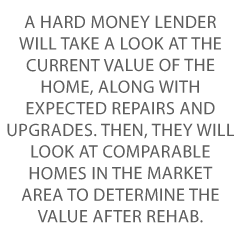A hard money loan, also known as an HLM, is a type of private money loan that provides financing for real estate investments.
This loan type is called “hard” because of the fact that the financing is backed by actual, physical assets, typically real estate.
Also, the loan amount is determined by what the value of the property will be in the future, when sold.
What are Hard Money Loans?
Essentially, a hard money loan is a loan to purchase property for repair. It may be residential or commercial real estate.
A hard money lender estimates what the value of the home will be after repairs are made. Usually this means comparing similar properties sold in the last 3 to 6 months in the same area.
The process is in contrast to how a conventional lender at a traditional bank does things. Conventional financing only lends based on the current value of the property.
Hard money lending is generally done as a balloon note. That means it is done as an interest-only monthly payment, with a balloon payment at the end of the term.
How Are Hard Money Loans Different from Traditional Real Estate Loans?
With a traditional mortgage, it can be difficult to get a loan to purchase property for resale or rent that needs a substantial amount of repair.
In contrast, hard money loans are made based on the property’s perceived value after repairs, giving the purchaser capital to both buy and repair the property.
What Are Typical Terms for Hard Money Loans?
The interest rates range anywhere from 12% to 18%. The final percentage depends on a number of factors, including the location of the property, the borrower’s credit history, and the property itself.
Sometimes, a borrower will be required to pay points on 3% to 10% of the loan total. That’s in addition to agreeing to a term length of 6 to 24 months.
At the end of the term, a borrower can refinance and convert the hard money loan into a conventional loan.
Alternatively, they can sell the property and pay off the loan. An example of this would be a fix-and-flip loan.
Hard Money Loan Requirements
The main thing when it comes to hard money loans is down payment or equity.
A hard money lender will take a look at the current value of the home, along with expected repairs and upgrades. Then, they will look at comparable homes in the market area to determine the value after rehab.
Usually you can get up to 70% LTV (loan-to-value) of whatever that amount is. Consider the following example.
Say a property appraises with an ARV of $500,000. A hard money lender will likely qualify you for a $350,000 loan ($500,000 x 70%).
If you can purchase the home, complete the rehab, and sell it for $350,000 or less, you both qualify for the loan and can finance the investment completely with hard money.
In that case, you would not have to worry about not qualifying for a commercial loan or traditional financing.
Usually the financing approval and terms are based solely on this formula of current value vs. rehab value, and not the creditworthiness of the borrower. That’s why it’s a hard money loan. The loan is based on the hard asset only.
Do Hard Money Loans go on your credit?
Most of the time hard money loans do not go on your credit report. This is because most of them, such as fix and flip loans, typically take the form of a short term loan. As mentioned above, terms are often as short as 6 to 24 months.
Since it takes a bit for accounts to show up on a report, anything recently funded may be paid off by the time it is even reported. It’s important to realize however that this is not always the case.
Discuss the specifics of your loan with your lender and make sure you understand them, including whether or not the loan will be on your credit report. Of course, even if it isn’t on your report, the loan will likely show up on a background check or asset search.
Most hard money lenders use these during the application approval process. So even if it doesn’t affect your credit score, it can still potentially affect your ability to get other funding.
Pros of Using Hard Money Loans
There are plenty of benefits to using a hard money loan to fund real estate investments.They can allow you to fund the purchase and rehab without having strong credit, and you can by-pass traditional lending and all the underwriting that goes along with it all together.
Here are some of the other pros to using a hard money loan.
Fast Funding
A hard money loan can close faster than a traditional loan since the private lender is mostly concerned about collateral. This goes back to the fact that your finances, credit, and employment are not relied upon nearly as heavily when it comes to making the lending decision.
As a result, underwriting is much different. You will not likely have to provide underwriters with documents commonly asked for when applying for a conventional loan.
These may include:
- Financial Statements
- Tax Returns
- Check Stubs
- Other financial information, both personal and business related
In fact, it’s more likely you will not have to provide anything other than information related to the purchase of the property and planned repairs.
Flexibility
Since there is no traditional underwriting process, deals are considered case-by-case. As the borrower, you are not negotiating with a commercial bank that has strict policies.
Rather, you are working with an individual or private company. As such, it may be possible to work out revised repayment schedules as well as duration.
Amount
The amount is based on the value of the home after rehab. Though lenders can vary, most will lend up to 70% LTV, as noted above.
This is different from a traditional loan, where you have to pre-qualify for a certain loan amount and then look for properties based on that pre-approved amount.
Cons of Using Hard Money Loans
Of course, nothing is perfect. There are some drawbacks to using this type of funding. For example, you have to rely on the lender’s perception of what the final value of the property will be.
Here are some other cons to using hard money lending.
Higher interest Rate
The interest rate on a hard money loan is going to be higher than that of traditional loans.
It’s because there is increased risk to the lender due to the fact they are providing you with immediate access to funds for your real estate investment.
Down Payments Vary by Lender
Hard money loans cost more. They have higher origination fees and closing costs. In addition, they usually require a larger down payment. Typically this is at least 25%-30%.
No Long-term Loans
The longer the loan term is, the greater the risk the lender assumes. Their investment could make less profit than what they would make investing in something else.
As a result, the lender is exposed to the risk of higher interest rates, which in turn discourages them from making long-term loans.
Hard Money Loan Alternatives
As a real estate investor, you may look for options other than private financing, like hard money loans, especially if you can’t make a hard money loan work.
You’ll have to consider a number of factors if this is the case. First, you’ll have to qualify for whatever financing you try to get. Then, you need to consider the interest rate.
For example, financing with a conventional loan or bridge loan may result in a lower interest rate, if you qualify. But, you will need to be sure you can make the monthly payment.
Another option is to use a credit card or line of credit for this type of financing. The pros of this type of funding include the potential for lower interest rates, and the fact that it is revolving money.
With hard money, the funds are gone after you repay. If you want to buy another property, you have to reapply. The funds are gone.
Reapplying before each purchase can cause you to lose precious time, and of course, time is money. Not only do you lose time getting started, but you could also lose out on property by not being able to make an offer as soon as you want to. With a line of credit, you have those funds available to use again, after repayment.
Of course to qualify for these alternatives, you will need to have a good credit score. Whereas with hard money, a good credit score is not as important. It is possible to use credit cards, but interest rates would still be high.
If you could turn properties around fast enough however, they are an option.
Hard Money Loans Are a Good Option, But They Aren’t Perfect
How do hard money loans work? Basically, you have to find a lender that is willing to take a chance on your investment property. They have to be willing to lend to you based on the perceived value of the property after rehab.
These are private lenders, not banks. A traditional lender will only lend based on what the property is currently worth.
It may take the form of a mortgage loan or another type of personal loan, but the result will be the same. While you may beat hard money loan rates with a personal loan or even a traditional business loan, the funding will be more difficult to qualify for if you do not have good credit.
By going with a private investor as a private money lender, you will have a better chance of getting access to funds from a private loan without worrying about credit scores or other typical requirements.



